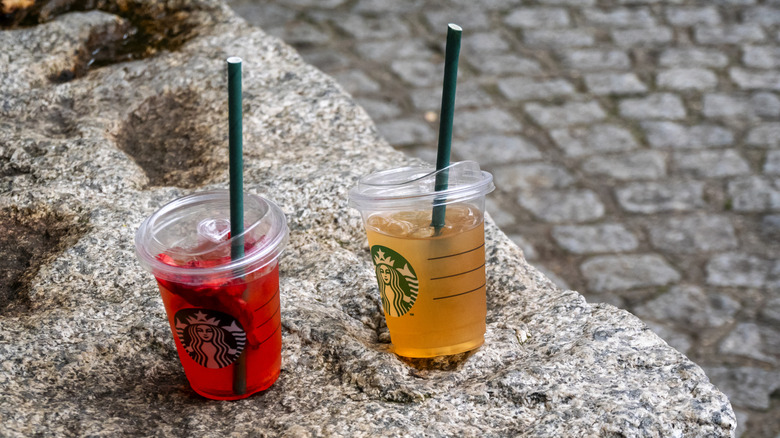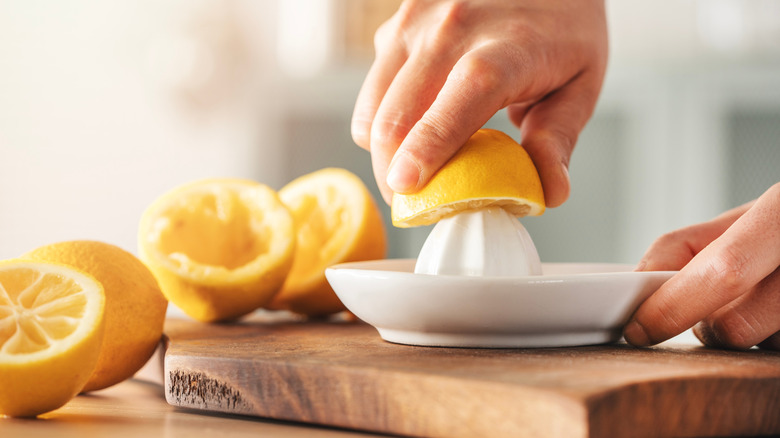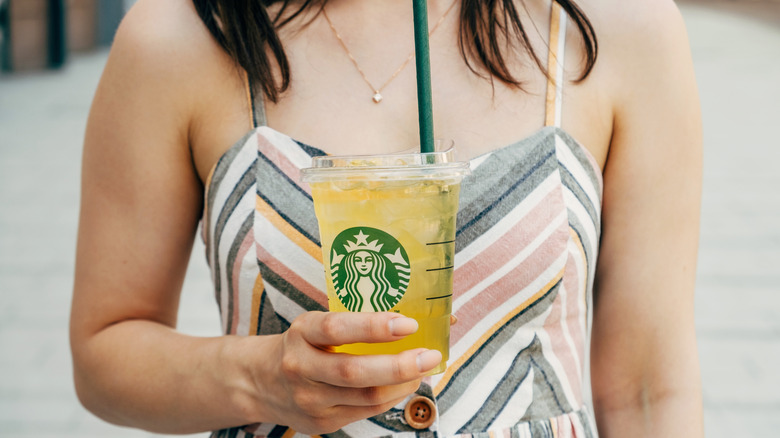The Type Of Lemonade Starbucks Uses To Make Its Tangy Drinks
I've had a few Starbucks lemonade drinks and have always thought to myself that they had a really pleasant and deeply tangy flavor. Interestingly enough, where you may just assume that it's your basic homemade lemonade from fresh squeezed lemons that gives that extra kick, you'd be mistaken.
They actually use a standardized lemonade concentrate, so not fresh squeezed at all. According to the product listing on Starbucks' menu, the lemonade used in their handcrafted beverages is a mix made with water, sugar, lemon juice concentrate, and natural flavors. The end result is a balanced, shelf-stable lemonade that pairs well with everything from iced tea to fruity refreshers.
This concentrated lemonade base is distributed in boxed containers behind the bar. It allows baristas to make consistent drinks quickly and in large batches, which is an essential part of maintaining efficiency during high-traffic hours. The use of a mix may surprise those expecting freshly squeezed juice, but Starbucks' focus is on delivering the same experience at thousands of locations worldwide, and that means minimizing variability.
You can even find Starbucks' lemonade concentrate for sale in bulk packs online, though they are labeled as "not for retail sale." If you're not willing to skirt the rules, however, you can create a similar concentrate at home that will provide the same flavor and convenience.
Why concentrate works better for Starbucks' drink lineup
Using boxed lemonade concentrate might sound like a shortcut, and technically it is, but in a setting like Starbucks, it's actually a carefully chosen solution that works across the coffee shop's menu. There are some differences between concentrate and fresh squeezed juice, but it works for the brand. The lemonade used in popular drinks like the Iced Passion Tango Tea Lemonade or the Strawberry Açaí Refresher with Lemonade needs to be more than just tart. It has to be stable, consistent, and flexible enough to mix with a range of syrups, teas, and fruit bases. That's where the concentrate is the most useful.
Concentrate is designed to deliver pucker-worthy lemonade that you can rely on without having to worry about whether the lemons you used were too bitter or not as ripe as the previous batch. It's also shelf-stable, which makes it easier to store and less prone to spoilage than fresh-squeezed juice. This is crucial for an operation the size of Starbucks, where waste reduction and supply chain control are important. Since fresh lemon juice oxidizes quickly and varies in flavor depending on seasonality and origin, it would be far too unpredictable to use across thousands of stores globally.
Additionally, concentrate blends more evenly with ice, a cold brew, and dairy alternatives than raw citrus juice would. That smooth consistency is part of why the drinks taste so cohesive, even when they include multiple components. So while some purists may scoff at the idea of using pre-mixed lemonade, in Starbucks' case, it's a smart choice that keeps the customer experience familiar.
Can you recreate the Starbucks lemonade flavor at home?
Trying to nail the exact taste of a Starbucks lemonade drink at home is pretty easy. You'll skip the juicer and go for a concentrate just like Starbucks does. As noted in listings for the official Starbucks Lemonade 2X Concentrate, this product is specially made to mimic what you get at the store, which is a lemony base that's sweet, tangy, and neutral enough to mix well with anything. Just dilute it according to the instructions, and you've got the foundation for a copycat refresher or Arnold Palmer. And who really has time to make sure you're making the perfect lemonade from scratch before blending it?
For a DIY version that comes close, you can combine bottled lemon juice with a simple syrup (equal parts sugar and water, simmered until dissolved) and a splash of white grape juice for depth. But it's hard to get the same punch without a commercial-grade base.
That said, some Starbucks fans have turned to online resellers or food service suppliers to get their hands on the real boxed stuff. While it's not always available to the general public through official channels, sites like Bonanza or eBay occasionally list unopened packs — perfect for superfans trying to bring the coffee chain experience home.


